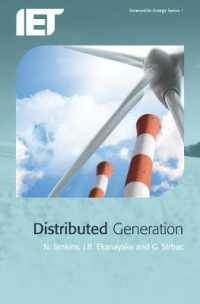- ホーム
- > 洋書
- > 英文書
- > Politics / International Relations
Full Description
Few events over the past few decades have given rise to an amount of debate and speculation concerning the state of the European Union (EU) and the future of European integration as the economic and financial crisis that began in 2007. In spite of substantial media, policy-making and academic attention, the fundamental questions of why and how the euro area (EA) has remained not only intact but also expanded and integrated further during the crisis require deeper theoretical investigation. One needs to understand not only the economics but also the politics and institutions of the crisis. A lack of such an understanding is the reason why a number of observers, at least initially, had a hard time making sense of policy-makers' decisions (and pace thereof), including why the EA did not implode as some predicted. Economic theories provide a certain perspective for why the crisis occurred and what economic policies were and are needed to resolve it; however, they fail to capture the deeper roots and management of the crisis.
In order to improve our understanding of a discussion that has oscillated between fears of EA disintegration on the one hand and the concrete advancement of integration during the crisis on the other, this special collection brings together leading scholars of European integration who apply key theoretical approaches - from liberal intergovernmentalism and neofunctionalism to other prominent theoretical accounts that have been applied to European integration such as historical institutionalism, critical political economy, normative theory, and a public opinion approach - to the economic and financial crisis. The contributions seek to analyse, understand and/or explain the events that occurred and the (re)actions to them in order to draw conclusions concerning the applicability and usefulness of their respective theoretical perspectives.
This book was published as a special issue of the Journal of European Public Policy.
Contents
1. European integration and the crisis: practice and theory 2. Liberal intergovernmentalism and the euro area crisis 3. European economic integration in times of crisis: a case of neofunctionalism? 4. A historical institutionalist explanation of the EU's responses to the euro area financial crisis 5. Public opinion and the crisis: the dynamics of support for the euro 6. Political legitimacy and European monetary union: contracts, constitutionalism and the normative logic of two-level games 7. Europe's ordoliberal iron cage: critical political economy, the euro area crisis and its management







